Summary
The U.N. warns that unless the world acts faster than promised, Earth's temperatures will rise to catastrophic, irreversible levels. The U.S. calls the upcoming climate summit the last chance for the world to avoid disaster. Nick Schifrin discusses the crisis with John Kerry, the president's special envoy on climate, and Frans Timmermans, executive vice president of the European Commission.
Five Facts
-
Who
is interviewed in this piece and what are their backgrounds?
-
What
are some of the things individual countries' leaders can be doing to help curb climate change, according to Kerry and Timmermans?
-
When
will global carbon emissions need to be dramatically reduced to avoid the worst effects of climate change, according to this interview?
-
Where
are some places where governments are falling sort of emissions goals?
-
How
are countries like the U.S. and China negotiating reduced emissions?
Focus Questions
-
Were you surprised to hear that the U.S. is not meeting its own goals to reduce carbon admissions? Why do you think that is, and what do you think are some consequences of failure to meet these goals?
-
What do you think are some good ways to ensure all nations are contributing to the goals of reducing climate emissions?
Media literacy:
Who might offer a different perspective on the priorities that national governments can take to help address climate change? Why do you think their perspectives are not included here?
For More
-
Use
this lesson
to explore how students can become agents of change through Sustainable Development Goals.






